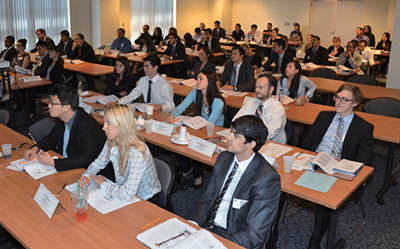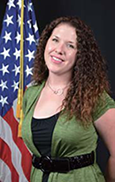HUMAN RESOURCES AND ORGANIZATIONAL DEVELOPMENT
Staff Development Department Holds 125 Training Courses and Programs
In 2013, the Staff Development Department offered over 125 training courses and programs. Total in-house training offerings increased by 140 percent, from 462 classes in 2012 to 648 in 2013. A total of 4,356 student seats were filled across the five divisions. Classroom training on desktop applications, such as Microsoft PowerPoint, were offered at all divisions. The Court launched the T minus 15 training program, which consisted of 15-minute training sessions conducted remotely, through WebEx. Students logged in at their desks and were back to work quickly. Courses offered through WebEx ensured staff members in all divisions received the same training at a reduced cost. Finally, annual programs including Law Clerk/Extern Training, IT Security Training, and the Winter Education Seminar were offered.
Winter Education Seminar: Moving Forward Strategically through Sharing Knowledge
 The 2013 Winter Education Seminar, “Moving Forward Strategically through Sharing Knowledge,” was held on December 6, 2013 at the Ronald F. Deaton Civic Auditorium in Los Angeles. Presentations educated the staff about the Court's Strategic Plan, new property management policies, new technologies, nutrition, and ergonomics. Chief Judge Peter H. Carroll, Executive Officer/Clerk of Court Kathleen J. Campbell, Chief Deputy of Administration Steve Sloniker, and Senior Deputy-in-Charge Paula Roe concluded the seminar by presenting awards for length of service and special service to the Court during 2013.
The 2013 Winter Education Seminar, “Moving Forward Strategically through Sharing Knowledge,” was held on December 6, 2013 at the Ronald F. Deaton Civic Auditorium in Los Angeles. Presentations educated the staff about the Court's Strategic Plan, new property management policies, new technologies, nutrition, and ergonomics. Chief Judge Peter H. Carroll, Executive Officer/Clerk of Court Kathleen J. Campbell, Chief Deputy of Administration Steve Sloniker, and Senior Deputy-in-Charge Paula Roe concluded the seminar by presenting awards for length of service and special service to the Court during 2013.
Emergency Preparedness Training
The Office Services/Space Planning Department continued to offer emergency preparedness and judicial security support to the Court through training and distribution of relevant supporting materials. Floor warden training was expanded to include all staff members, supervisors, and managers. District-wide training sessions were mandatory for the Clerk's Office staff and strongly recommended for chambers staff. The Court also addressed various emergency communications issues and implemented an interim judicial evacuation protocol which supports current U.S. Marshals Service capabilities.
Law Clerk/Extern Training Program
 In 2013, the Court held three Law Clerk/Extern training sessions at the Edward R. Roybal Federal Building and U.S. Courthouse in Los Angeles. The sessions drew more than 100 participants, including participants from the U.S. District Court. Judges Barry Russell, Alan M. Ahart, Sheri Bluebond, Deborah J. Saltzman, and Neil W. Bason each spoke about a different aspect of bankruptcy. Following presentations by a panel of law clerks and bankruptcy attorneys, staff members from the Clerk’s Office and the U.S. Courts Library conducted tours. The program also included a brief presentation by a U.S. Courts assistant librarian. Law Clerk/Extern training is designed to provide bankruptcy knowledge and other relevant information to chambers staff and future members of the bar.
In 2013, the Court held three Law Clerk/Extern training sessions at the Edward R. Roybal Federal Building and U.S. Courthouse in Los Angeles. The sessions drew more than 100 participants, including participants from the U.S. District Court. Judges Barry Russell, Alan M. Ahart, Sheri Bluebond, Deborah J. Saltzman, and Neil W. Bason each spoke about a different aspect of bankruptcy. Following presentations by a panel of law clerks and bankruptcy attorneys, staff members from the Clerk’s Office and the U.S. Courts Library conducted tours. The program also included a brief presentation by a U.S. Courts assistant librarian. Law Clerk/Extern training is designed to provide bankruptcy knowledge and other relevant information to chambers staff and future members of the bar.
Contract Administration Training
In June 2013, the Court organized and hosted a two-day cross-agency training session for employees who perform the role of Contracting Officer’s Representative (COR) at their agencies. In addition to Bankruptcy Court staff, the program was attended by members of the U.S. District Court, U.S. Probation Office, and U.S. Pretrial Services. The course was facilitated by an experienced instructor from the Northwest Procurement Institute. The program provided CORs with complete and comprehensive coverage of contract formation and contract administration policy and issues, including standards of conduct and ethics; development of requirements documents; contract documentation; inspection procedures; and changes, terminations, and disputes.
Educational Presentation Highlights Issues in Bankruptcy Law
In July 2013, the Court partnered with the Ninth Circuit Law Library and LexisNexis to bring the educational “Bankruptcy Showcase” program to the Court. The program was broadcast to judges and chambers staff at participating divisions. Presenters included Seth Goldman, Bankruptcy Partner at Munger, Tolles & Olson LLP and contributing author to Collier on Bankruptcy; Sandy Li, Assistant Librarian at the Edward R. Roybal Federal Building and U.S. Courthouse Law Library; and Betsy Post-Garza, Esq., Senior Government Consultant at LexisNexis. Mr. Goldman began by discussing Stern v. Marshall, 131 S. Ct. 2594 (2011) and its impact on fraudulent transfer claims, implied consent, and other recent decisions. The program continued with the implications of mortgage enforcement and emerging issues. Finally, current developments in the Third, Fourth, Fifth, and Seventh Circuits were presented, including rulings relating to the artificial impairment of a class; taxes and property of the estate; intellectual property/trademark rights; and earmarking doctrine in the context of bankruptcy law. Following the presentation, the Law Library staff and LexisNexis representative briefly highlighted key research tools and resources of interest to judges and chambers staff.
African-American Heritage Month
On February 22, 2013, the Riverside Division celebrated African-American Heritage Month with a luncheon. Cynthia Jeanmarie began the celebration with an activity that required all participants to name remarkable African-Americans.
On February 28, 2013, members of the Judiciary gathered at the Edward R. Roybal Federal Building and U.S. Courthouse in Los Angeles to attend the dynamic heritage program “Civil Rights: How Far We’ve Come and What Still Needs to Be Done.” Featured speakers included District Judge Otis D. Wright II and UCLA Law Professor Cheryl Harris. Kevin Frazier, host of The Insider, acted as Master of Ceremonies, and U.S. Attorney André Birotte, Jr. and Supervising Deputy Federal Public Defender Callie Steele, Esq. contributed remarks. Judge Wright shared stories about several of the obstacles he overcame on his journey to the federal bench. Professor Harris gave an in-depth analysis of Plessy v. Ferguson, 163 U.S. 537 (1896) emphasizing important lessons from this landmark case and tying the case to larger societal attitudes and behaviors. The program linked the advances made by African-Americans with issues still awaiting resolution today.
Lesbian, Gay, Bisexual, Transgender, and Questioning Pride Month
In a first for the Central District, the U.S. Attorney’s Office coordinated a Lesbian, Gay, Bisexual, Transgender, and Questioning (LGBTQ) Pride Month celebration event on June 20, 2013 in District Judge Beverly Reid O’Connell’s courtroom. Bankruptcy Judge Maureen A. Tighe and District Judge Michael W. Fitzgerald, two of the first openly LGBTQ judges in the district, addressed an enthusiastic audience.
The program title, “It Gets Better,” was taken from a recent effort to create a positive outlook for LGBTQ teens, who suffer from a high incidence of suicide in the face of bullying, exclusion, and other difficulties. Judge Tighe and Judge Fitzgerald expanded the “It Gets Better” message to include the entire LGBTQ community as the judges took a look over the last four decades and highlighted some of the milestones that have been achieved.
HRMIS Leave Tracking Implemented
In January 2013, Court staff began submitting leave requests and timesheets via an automated system developed by the Administrative Office of the U.S. Courts called Human Resources Management Information System (HRMIS) Leave Tracking. Training classes were held during November and December of 2012. The automated system eliminates the use of paper timecards and leave slips, increases accuracy and visibility of leave schedules and usage, and has reduced the labor costs associated with manually processing timecards and leave requests.
ePerformance and Individual Development Plans: Fostering Dialogue and Promoting Development
The Court introduced two new automated tools in 2013: PeopleSoft Human Resources Management Information System (HRMIS) ePerformance and Individual Development Plans (IDP). The introduction of ePerformance enabled all Performance Evaluations (PE) to be completed online. Automating the PE process across the district helped the Court increase efficiency.
Also, the Court added an IDP to each Performance Plan. The use of IDPs supports the Court’s mission, goals, and objectives as outlined in the Strategic Plan, which prioritizes aligning employee training and development in order to maintain a highly-skilled and well-trained workforce.
Paths to Success Leadership Development Program
The 2013-2014 Paths to Success Leadership Development Program welcomed a cohort of 19 participants on March 1, 2013. Paths to Success offers the Court’s aspiring leaders the opportunity to develop their leadership skills and project management skills through classroom courses, online training, coaching, and on-the-job learning. Participants attended eight classroom sessions over the course of the year. The courses included “Leadership with Maturity and Passion,” “Acts with Integrity,” “Communicates Effectively,” “Respects Others,” “Solves Problems,” and “Manages Conflicts.”
Workforce and Succession Planning
The Court facilitated Workforce Planning training and workshops for its managerial staff throughout 2013. While Workforce Planning is an ongoing process, this initiative enabled Court management to address staffing levels proactively, particularly around re-engineering department structures, competencies, human resources metrics, and succession planning. Succession planning initiatives such as the Paths to Success Leadership Program and Knowledge Management Program are designed to develop management skills in emerging leaders, capture and transition industry-specific knowledge from Court employees leaving through attrition, and enable the Court to further align its workforce skills with its strategic initiatives.
Internal Employment Opportunities
In January, the Clerk’s Office announced 11 internal employment opportunities at the Los Angeles Division. New positions were created to address shifting trends within the Court in the following areas: Records Management, Call Center, and Pro Se Help Desk.
The Records Management team was created to focus on district-wide records management responsibilities and ensure the Court’s records management program meets all statutory requirements, remaining abreast of changes in records regulations.
As part of an ongoing effort to improve public service, five customer service representatives were assigned to staff the Court’s new district-wide Call Center and handle incoming calls and online chat. The centralization of customer service staff and the development of a new call script have increased efficiency, while also improving the consistency of information now provided to the public. The Call Center is also able to provide assistance to Spanish speaking customers.
The Los Angeles Pro Se Help Desk staff coordinates a variety of district-wide pro se activities, and assists in the testing and implementation of the electronic Self-Representation (eSR) software developed through the Pro Se Pathfinder Project.
Voluntary Incentive Programs for Employee Separations (Buyouts)
In 2013, the Court requested and received approval from the Administrative Office of the U.S. Courts to offer 21 buyouts and early retirements. The request for buyouts and early retirements was necessitated by the continuing serious funding challenges facing the Judiciary. These buyouts and early retirements helped to offset the Court's budgetary shortfall.
Clerk's Office Staff Certifications and Credentials
Sabrina Palacio-Garcia Graduates from MSU Judicial Administration Certificate Program
 During the National Conference of Bankruptcy Clerks business lunch on August 14, 2013, conference attendees celebrated the accomplishments of bankruptcy clerks from across the country who completed the Michigan State University (MSU) Judicial Administration certificate program within the past year. The Central District was especially proud of Operations Specialist Sabrina Palacio-Garcia, who received her MSU Judicial Administration certificate at the conference. The MSU certificate program requires the completion of 10 courses and a capstone project. It is comprised of 60 contact hours of instruction based on the National Association for Court Management core competencies. The 10 courses cover such topics as case flow and human resources management, budget and finance, and strategic planning. Given the Court's budgetary challenges and the high rate of anticipated retirements, Ms. Palacio-Garcia chose to review the Court’s succession and strategic plans as her capstone project and completed the certificate program within one year.
During the National Conference of Bankruptcy Clerks business lunch on August 14, 2013, conference attendees celebrated the accomplishments of bankruptcy clerks from across the country who completed the Michigan State University (MSU) Judicial Administration certificate program within the past year. The Central District was especially proud of Operations Specialist Sabrina Palacio-Garcia, who received her MSU Judicial Administration certificate at the conference. The MSU certificate program requires the completion of 10 courses and a capstone project. It is comprised of 60 contact hours of instruction based on the National Association for Court Management core competencies. The 10 courses cover such topics as case flow and human resources management, budget and finance, and strategic planning. Given the Court's budgetary challenges and the high rate of anticipated retirements, Ms. Palacio-Garcia chose to review the Court’s succession and strategic plans as her capstone project and completed the certificate program within one year.
John Kohler and Herbert Seales Certified by FEMA
In 2013, Administrative Manager John Kohler and Administrative Specialist Herbert Seales were certified by the FEMA National Continuity Program. Mr. Kohler and Mr. Seales completed Level I in FEMA’s Continuity Excellence Series training. The curriculum is designed to give students a thorough understanding of Continuity of Operations Planning at the national and local levels and to help prepare for disaster response in the workplace.
Leanne O'Brien Earns Facility Management Credential
 In July 2013, Facilities Project Coordinator Leanne O’Brien earned a Facility Management Professional (FMP) credential from the International Facility Management Association (IFMA). Ms. O'Brien completed courses in Operations and Maintenance, Project Management, Finance and Business, and Leadership and Strategy in order to qualify for the credential, which demonstrates her mastery of the foundations of facility management. Ms. O'Brien increased her depth-of-knowledge in Facility Management, enhanced her skills, and gained credibility among peers and professionals.
In July 2013, Facilities Project Coordinator Leanne O’Brien earned a Facility Management Professional (FMP) credential from the International Facility Management Association (IFMA). Ms. O'Brien completed courses in Operations and Maintenance, Project Management, Finance and Business, and Leadership and Strategy in order to qualify for the credential, which demonstrates her mastery of the foundations of facility management. Ms. O'Brien increased her depth-of-knowledge in Facility Management, enhanced her skills, and gained credibility among peers and professionals.

